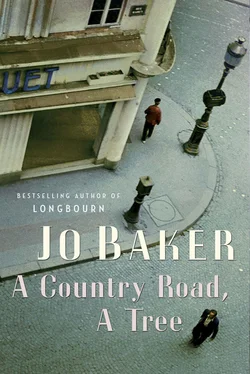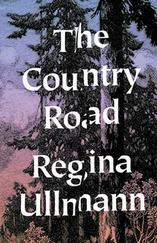The church is open to the sky: the priest stands, vestments pulled over a bulky coat, bald head bowed, and snow falls on him. Snow carpets the stone flags, covers the altar with a blue-white pall. Snow drapes the edges of protruding masonry and the scorched and broken timbers. The candles flicker and fizz as the snowflakes hit them.
They are gathered there, all of them; they sing. The colonel, the volunteers, the ancillary workers, the new matron with her cap and cape. The Catholic contingent of the prisoners of war are with them in the snow. He thinks he catches the bristly profile of the German doctor. And the thin women from the ramshackle bawdy-house. And children, small ones held sleeping, older ones bundled up in jackets and scarves. Near the back, a youth with a small boy pressed into his side, heads tilted back to bawl out the hymn together.
It’s impressive, that conspiracy. That insistence that everything means something, that happenstance will be made to fit a pattern, for all that the pattern cannot be discerned from where they stand, human, their feet upon the earth. That everything must be referred upward, into the empty sky.
He turns away, back into the night, the snow falling. He gets back into the stuffy crampedness of the cab and finishes his cigarette. It’s a kind of homesickness, he suspects. But then he never entirely felt at home.
Movement at the cab door: she climbs back into the truck with a cloud of cold and thumps the door shut behind her.
“Beautiful,” she says. “Thank you.”
“Good,” he says. “I’m glad.”
The engine clears its throat, and clears its throat again, uncertain: diesel doesn’t like the cold. But it settles into its phlegmy rattle and he stamps on the clutch.
“Not far now,” he says. “Just on up the road.”
He shoves the gearstick sideways, then shunts it forward; he releases the pedal and they lunge away again, through the broken town shawled in snow.
“You must be tired of ferrying people around at all hours.”
“I’ve put you through it tonight,” he says. “I’m sorry.”
He swerves round on to the road that leads up to the hospital; here the snow is worn to slush.
“Oh,” she says. “No.” She grips the door handle and the seat as they take the bend.
“My contract’s up. I’m afraid my mind’s elsewhere. And you wanted to get to Mass, so…”
He turns down the main drive, passes a row of huts. They pull up outside the women’s barracks.
“We shall be sorry to lose you, I’ve no doubt,” she says.
“The place is all set up now, so, they’re grand.”
“What will you do next?”
He yanks the handbrake on and clumps the gearstick back into neutral. “Start again,” he says. “I suppose. Just like everybody else.”
—
The white huts are almost pretty, with their curtained windows warm in the twilight, and he walks along the clean frosty pathways to where his lift is waiting for him.
There are footfalls indoors as the nurses do their rounds; there are murmured voices, there are those hard ungovernable coughs of the tubercular patients. He can hear the buzz of chat from the rec hut, the pock and tap of the table-tennis balls. He has made the necessary farewells. He doesn’t want to make any unnecessary ones, has no desire to linger.
He runs his tongue round his mouth, the gaps and the smooth places where the decay was halted and the voids were filled. The absence of pain is a thing in itself, though not painlessly achieved. Like this place, this scraped-clear bit of earth where the rubble has been brushed aside and something sound is made of it.
It’s temporary, of course; everything’s always temporary. Decay is paused, not halted; ruin is always incipient. One day, before you know it, all of this will be half-rotten, streaked with green and crawling with woodlice. But that doesn’t mean it wasn’t worth the doing.
The new matron steps out of the women’s ward and comes walking down the path towards him. Her eyes are tired but her expression is light; she actually looks happy. She sees him, kitbag and coat, heading to the cars.
“Are you going right away?” she asks.
“My lift’s waiting.”
“Hang on just two minutes before you go.” Her hand is on his arm, she is drawing him back.
She leads him into the women’s ward, up the step and indoors. One corner is curtained off. At the far end of the hut, a woman sleeps, curled on her side.
“Come, see.”
She eases back the curtain and there is a row of little cots. He knows these cots. He has an invoice filed away for them back up at the stores. In one, swaddled in white linen and tucked in tight under cellular blankets, is a tiny raw-looking thing, patched with flaking skin. Its birdlike breast barely lifts the covers, but it does lift the covers, and, as he watches, it keeps on doing so. Impossible tiny little breaths in a creature not yet used to breathing. A being not yet used to being.
“Is it all right?”
“Oh yes. Perfectly. He’s just a few hours old.”
“And the mother?”
The nurse nods, and in her smile is the knowledge of a job well done. “She’s doing fine.”
The infant stirs; its lips move. It doesn’t cry. Its eyes open, and they are dark and bluish and alien.
“It isn’t crying.”
“They don’t always cry,” Matron says.
He looks down at the small creased thing, which stares back at him with an ancient calm.
“They do keep on being born, don’t they?”
“Hm?”
“People. Babies.”
“They rather insist on it.”
“Poor little scrap,” he says.
“New life, though,” she says. “It gives you hope.”
“Oh, don’t say that,” he says. “That’s not fair.”
He considers the curled-up creature there, the years that it will have to live through, the best outcome at the end of it all. Why would you do that to someone, out of love? And aren’t they supposed to cry? When we are born, we cry that we are come to this great stage of fools. It’s just a natural reaction.
“Well,” he says. “God bless.”
A big, lovely smile from her, as if he has expressed some kind of approval, as if something has been agreed between them.
“God bless,” she says.
He shoulders his kitbag and slips out through the door. Hope is not a thing that he can bring himself to consider. It really does not agree with him at all.
CHAPTER TWENTY-TWO PARIS, January 1946
“I’ll walk from here.”
He slides out at the corner, slams the door, raises a hand in thanks. The vehicle rattles away. There is ice between the cobblestones; there is frost on the railings. He turns his collar up. His coat now is worn to fit his body, it has softened to him. Made itself be his.
The street-market is busy on the rue de Vaugirard, but the stalls are thinly stocked. A few winter cabbages, half a barrow-load of potatoes, a pile of chestnuts; everything is sad and slight and mean-looking, and there is a conspicuous absence of bread, since it’s back on the ration. A few pewter-grey fish lie cold in the cold air. The housewives are pecking grimly through these offerings. He notices the prices chalked on the little boards and winces. It is going to be impossible to live on his allowance. It was stupid to walk away from a proper salary, ridiculous to leave behind the chickens and the Calvados and the jam and the nice warm little huts, to try again at this impossible thing that nobody cares whether he does or doesn’t do, and for which no payment is to be anticipated. It was stupid, impossible, ridiculous, and absolutely necessary.
He peers up the face of the apartment building. His little casement is unlit; behind it waits a pool of calm and quiet. If Suzanne is elsewhere. He goes in through the lobby door. The lift is still out of order; the stairs twist upward, into shadow. His head is too full to accommodate the possibility of her, to accommodate anything other than what has to happen next. The cupboard in the back of his mind is ready to burst open, and all the mess that has been shoved in there will spill out on to the floor. He has to have the space, the quiet, to let that happen, to deal with the mess, sort through it and shape it into something.
Читать дальше










